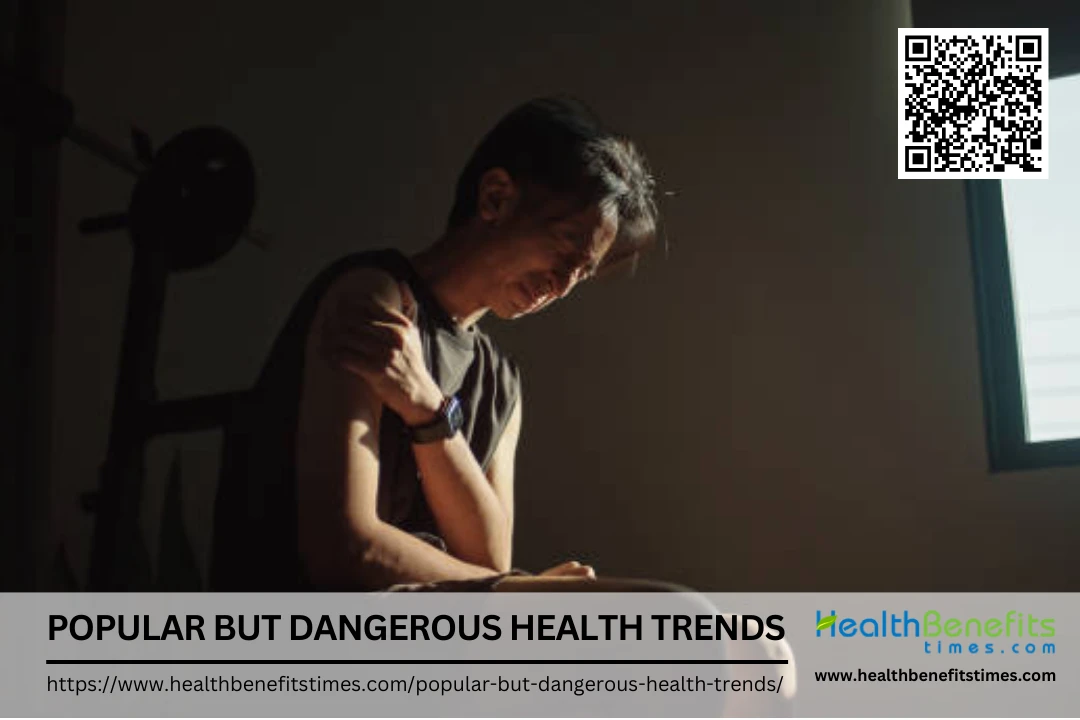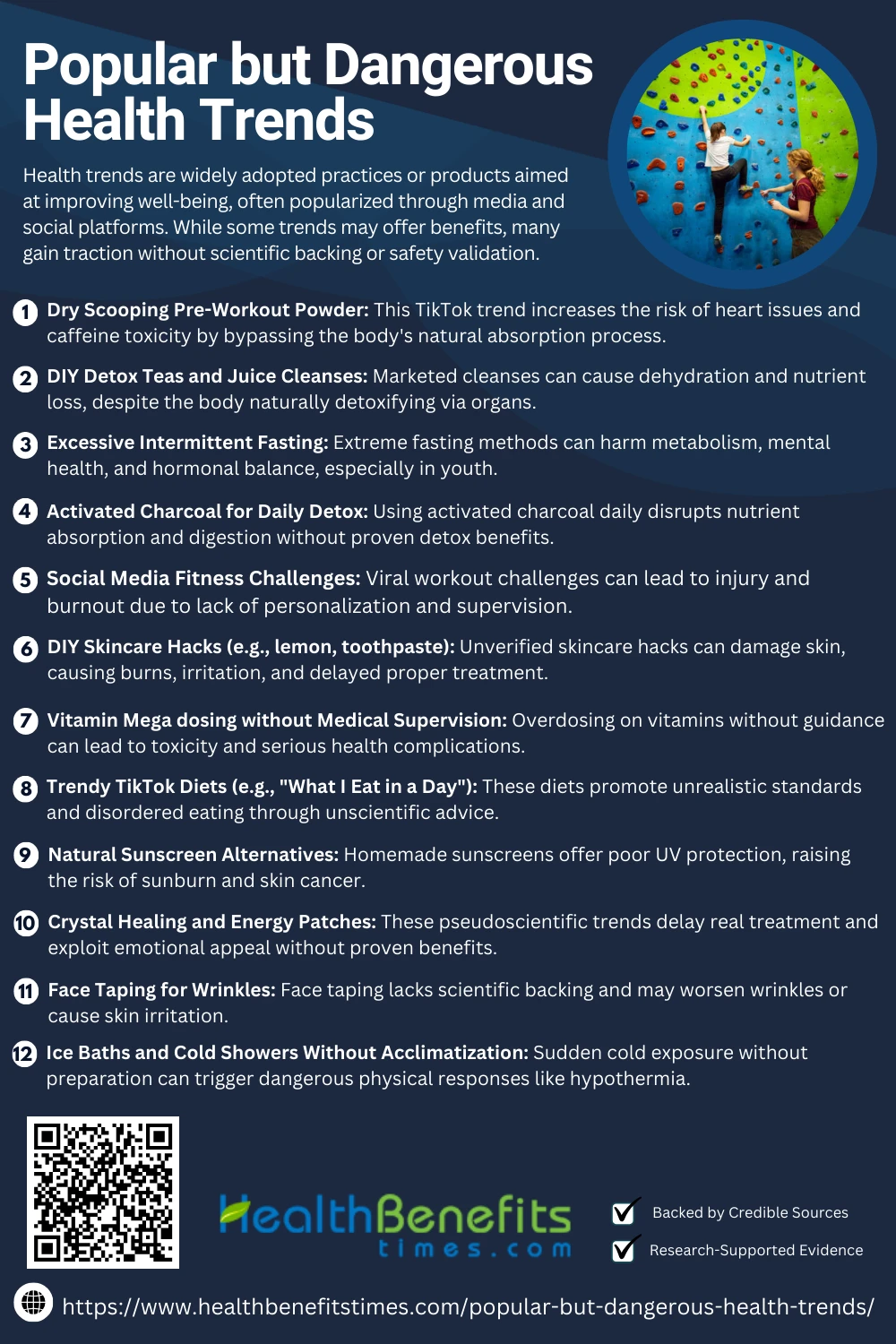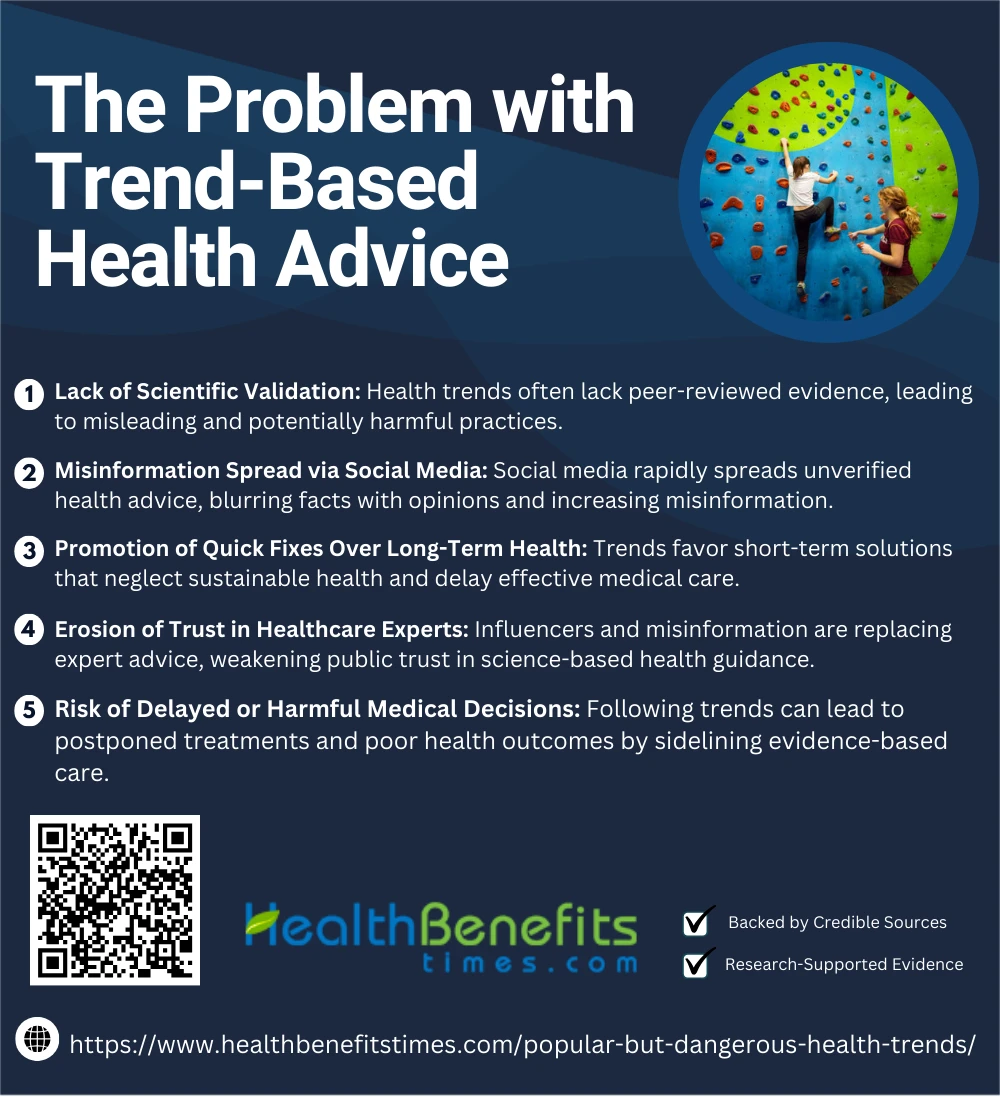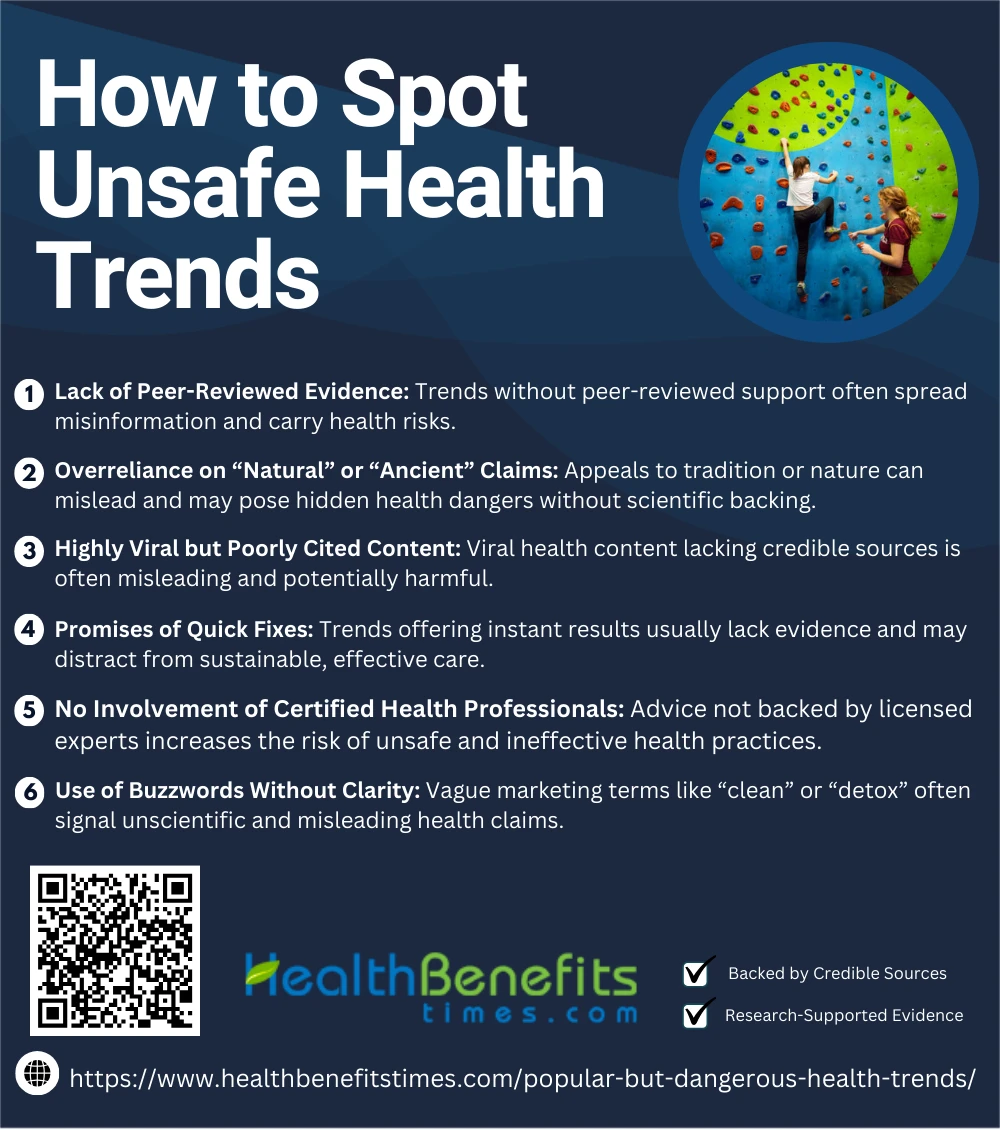- Health trends are widely adopted practices or products aimed at improving well-being, often popularized through media and social platforms.
- While some trends may offer benefits, many gain traction without scientific backing or safety validation.
- Following such trends without proper guidance can lead to harmful health outcomes or delayed medical treatment.
 Health trends are widely adopted practices or beliefs related to well-being, often driven by societal shifts, media influence, or evolving scientific findings. In the digital age, popular health trends can spread like wildfire—especially through platforms like TikTok, Instagram, and YouTube. While many of these practices are marketed as quick fixes or “natural” solutions for complex health issues, they often lack scientific backing and can pose serious health risks. For example, social media has amplified the normalization of extreme detoxes, DIY hormone therapies, and even unsafe fitness hacks, sometimes with dire consequences. Recent studies emphasize the growing concern among healthcare professionals regarding the influence of viral misinformation on vulnerable populations, especially adolescents and young adults. These trends, while seemingly harmless, demand careful scrutiny before adoption.
Health trends are widely adopted practices or beliefs related to well-being, often driven by societal shifts, media influence, or evolving scientific findings. In the digital age, popular health trends can spread like wildfire—especially through platforms like TikTok, Instagram, and YouTube. While many of these practices are marketed as quick fixes or “natural” solutions for complex health issues, they often lack scientific backing and can pose serious health risks. For example, social media has amplified the normalization of extreme detoxes, DIY hormone therapies, and even unsafe fitness hacks, sometimes with dire consequences. Recent studies emphasize the growing concern among healthcare professionals regarding the influence of viral misinformation on vulnerable populations, especially adolescents and young adults. These trends, while seemingly harmless, demand careful scrutiny before adoption.
The Allure of Health Trends
The psychology behind popular health trends often revolves around our innate desire for simplicity and control. Viral wellness content exploits this by promising “natural” solutions and “quick fixes” that seem safer or more virtuous than medical treatments. The appeal of effortless detoxes, cleanses, or miracle diets taps into cognitive shortcuts our brains take when overwhelmed with complex health information. (1)
Celebrities and wellness influencers have become the modern gatekeepers of health advice, often lacking medical credentials but commanding mass influence. Their endorsements—intentional or not—can drive massive behavioral shifts among followers. From promoting supplements to endorsing unverified treatments, these figures blur the line between marketing and medical guidance. (2)
Platforms like TikTok, Instagram, and YouTube act as echo chambers for wellness misinformation, where virality often outranks accuracy. This unchecked environment encourages the spread of pseudoscientific content, making it harder for users to distinguish facts from trends.
Popular but Dangerous Health Trends
Many health trends gain popularity through social media and celebrity endorsements, but not all are safe. Some pose serious health risks despite their popularity, making awareness and caution essential.
 1. Dry Scooping Pre-Workout Powder
1. Dry Scooping Pre-Workout Powder
Dry scooping pre-workout powder—a TikTok-fueled trend where users consume supplement powder without water—has been linked to cardiac arrest, esophageal damage, and caffeine toxicity. Research warns that this method intensifies stimulant absorption, bypassing dilution and digestion safeguards. (3) It may also trigger psychosis-like symptoms in adolescents and heart complications, including myocardial infarction. (4) The “dry scooping” TikTok phenomenon reflects harmful misinformation without clinical supervision, and adolescents report engaging in it for social media validation rather than performance. (5) (6)
2. DIY Detox Teas and Juice Cleanses
Detox teas and juice cleanses are marketed as quick fixes to “flush toxins,” yet their scientific basis is deeply flawed. Studies highlight that the body detoxifies naturally via the liver and kidneys—no external cleanse needed . (7) Juice fasts can cause hypoglycemia, muscle loss, and nutrient deficiencies. (8) Moreover, detox teas—often laced with laxatives—may lead to dehydration and electrolyte imbalance. (9) Social media glamorizes these trends through influencer-driven campaigns, often ignoring long-term health harms. Experts call for critical scrutiny of such pseudoscientific wellness rituals. (10)
3. Excessive Intermittent Fasting
Excessive intermittent fasting, especially extreme protocols like OMAD (one meal a day), can lead to hypoglycemia, nutrient deprivation, and cardiometabolic disruption. Studies show that social media–driven fasting can worsen mental health, especially in teens and those with eating disorder histories. (11) Overfasting may trigger hormonal imbalance, fatigue, and poor metabolic flexibility. (12) Behavioral studies also link excessive fasting to reduced brain performance and anxiety. (11) Despite influencer hype, prolonged fasting may harm long-term health. It’s essential to distinguish between controlled intermittent fasting and extreme, unverified versions promoted online.
4. Activated Charcoal for Daily Detox
Using activated charcoal daily for detox is a widely circulated wellness myth unsupported by science. While effective for acute poisoning, its everyday use can block nutrient absorption and interfere with medications. (8) Research reveals that such practices stem from pseudoscientific misinterpretations of “toxins” and bodily cleansing. (9) Long-term use has shown to impair digestion and gut flora. (10) The wellness industry leverages emotional appeals to sell detox products with little regulation. (7) Experts warn that daily detox routines create a false sense of cleansing, while disrupting genuine metabolic functions.
5. Social Media Fitness Challenges
Fitness challenges like “#75Hard” or TikTok’s “plank to push-up” may motivate, but they often ignore safety, personalization, and form, leading to overexertion, muscle strain, or even serious injuries. Studies link these challenges to rising orthopedic injuries and mental burnout in youth. (13) Many viral workouts lack supervision or adaptation for beginners. (14) Experts warn these trends promote performance over well-being. (1) TikTok’s influence on body image and exercise intensity is also psychologically damaging. (15) Moreover, these challenges may trigger obsessive behaviors rather than sustainable fitness goals. (16)
6. DIY Skincare Hacks (e.g., lemon, toothpaste)
TikTok and Instagram have glorified DIY skincare hacks using household items like lemon juice, baking soda, and toothpaste—but dermatologists warn of serious risks. Applying lemon to skin can cause chemical burns and hyperpigmentation due to its phototoxic nature . Toothpaste, often used for acne, contains abrasives and irritants not safe for facial use. Studies report a rise in DIY-induced skin damage among teens influenced by unverified online claims. (8) Misleading content often overshadows scientific evidence and fuels misinformation. (10) Health experts stress that cosmetic myths shared online may delay real treatment and exacerbate skin issues.
7. Vitamin Mega dosing without Medical Supervision
Vitamin mega dosing promoted on social media poses serious health risks, including toxicity and organ damage when taken without proper medical supervision. High doses of Vitamin D, A, or C, often marketed as immune boosters, have been linked to adverse outcomes like hypercalcemia, kidney stones, and cyanide toxicity. (17) (18) (19) Despite being marketed as natural, excessive vitamin intake can interfere with metabolism and medications. (20) Furthermore, social media has amplified misinformation about megadosing’s effectiveness. (21)
8. Trendy TikTok Diets (e.g., “What I Eat in a Day”)
Trendy TikTok diets often go viral with little scientific basis, pushing risky behaviors like extreme calorie deficits, unverified food combinations, and elimination of essential nutrients. Research shows that such diets can trigger disordered eating, especially among youth. (17) Many TikTok nutrition videos contain misinformation (source) and distort perceptions of health. (22) The “What I Eat in a Day” trend further fuels toxic comparisons. (23) Even influencers often misrepresent evidence-based health practices. (24)
9. Ice Baths and Cold Showers Without Acclimatization
While cold exposure has documented mental and physical benefits, the growing TikTok-fueled obsession with ice baths and cold showers without proper acclimatization presents real health dangers. Sudden exposure can trigger cold shock, arrhythmias, or even hypothermia in untrained individuals. (25) Despite viral claims of recovery boosts, improper practice can result in more harm than healing. (26) Many users are unaware of the necessary adaptation phase. (27) Moreover, misinformation on platforms like TikTok has misled audiences on cold therapy’s scope and timing. (28) A structured, medically informed approach is vital. (29)
10. Natural Sunscreen Alternatives
The use of coconut oil, shea butter, and essential oils as natural sunscreens has surged online, but these alternatives often provide inadequate UV protection compared to medically approved SPF products. Research shows that homemade options block as little as 20% of UV rays, failing to prevent long-term skin damage. (30) Despite their appeal as “non-toxic” options, coconut oil’s SPF is under 7, dangerously below recommended levels. (31) The rise of such DIY remedies on Pinterest and TikTok has even led to spikes in sunburn and skin cancer concerns. (32) Dermatologists warn that natural doesn’t mean safe, especially when exposed to intense sun. (33)
11. Face Taping for Wrinkles
Face taping for wrinkles, popularized by TikTok influencers, claims to prevent expression lines—but dermatologists warn it can actually weaken facial muscles and cause skin irritation. The adhesive can disrupt skin barrier function and even lead to contact dermatitis. (34) TikTok-driven trends often misrepresent clinical efficacy. (35) Aesthetic dermatology literature highlights that these methods have no scientific grounding. (36) Users also risk exacerbating wrinkles through repetitive strain and tension. The broader issue is the misinformation propagated through beauty content online.
12. Crystal Healing and Energy Patches
Crystal healing and energy patches, widely marketed on social media, lack any scientific mechanism and are labeled as pseudoscientific by health experts. These practices often substitute real medical care, leading to delayed treatment and false hope. (37) Despite their emotional appeal, such therapies are promoted through disinformation ecosystems. (38) Studies show these beliefs persist due to social validation and influencer marketing. (39) Energy patches also fall under unregulated wellness claims, potentially risking users’ physical and mental health. (40) Pseudoscientific trends thrive due to media amplification and lack of consumer skepticism. (41)
The Problem with Trend-Based Health Advice
Trend-based health advice often lacks scientific validation and promotes one-size-fits-all solutions. Following such trends without expert guidance can lead to misinformation, ineffective treatments, and potential health risks.
 1. Lack of Scientific Validation
1. Lack of Scientific Validation
Many trend-based health practices lack rigorous scientific testing, relying instead on anecdotal evidence and viral popularity. This absence of peer-reviewed validation contributes to pseudoscience and can mislead users into adopting harmful behaviors. Research highlights the nutritional risks of such unverified claims. (42) Additionally, flawed methodology in pseudoscientific practices has been compared to outdated scientific misconduct. (43) Without proper vetting, these trends undermine evidence-based medicine. (44)
2. Misinformation Spread via Social Media
Social media platforms have amplified unverified health claims, often favoring engagement over evidence. Viral health content spreads faster than corrections, leading to widespread misinformation and misinformed health choices. Dermatology research notes that many viral remedies lack safety data or misrepresent scientific facts . Additionally, social forums often blur the line between opinion and expertise. (45)
3. Promotion of Quick Fixes Over Long-Term Health
Trend-based health advice often emphasizes instant results—detoxes, crash diets, and miracle supplements—at the expense of sustainable wellness. These short-term solutions neglect the complexities of chronic disease management and long-term risk reduction. (46) As a result, users may delay professional care and prioritize trends over proven prevention strategies. (47)
4. Erosion of Trust in Healthcare Experts
Social media has disrupted public trust in medical authorities, replacing vetted expertise with influencer opinions and crowd-sourced advice. Research reveals that misinformation-fueled skepticism undermines the credibility of science-based recommendations. (48) This erosion of trust can lead to vaccine hesitancy, DIY treatments, and avoidance of care. (44) The outcome is a population vulnerable to pseudoscience and public health crises.
5. Risk of Delayed or Harmful Medical Decisions
Trend-based health advice often diverts individuals from timely, evidence-based care. Many users delay proper treatment in favor of viral remedies, worsening health outcomes. (49) Misinformed behaviors—like using detoxes over medication—undermine chronic disease management and can fuel public mistrust in verified therapies. (50) (51)
How to Spot Unsafe Health Trends
With health trends spreading rapidly online, it’s crucial to identify which ones are safe. Learning to spot red flags can protect you from misleading, ineffective, or even harmful wellness practices.
 1. Lack of Peer-Reviewed Evidence
1. Lack of Peer-Reviewed Evidence
Many trending health tips circulate without any backing from peer-reviewed research, relying instead on anecdotes or influencer endorsements. This absence of scientific scrutiny can lead to harmful outcomes. Experts warn that unverified wellness practices bypass rigorous review and often mislead the public. (9) Pseudoscientific advice shared online lacks empirical grounding. (52) Media effects also amplify these trends without critical evaluation. (53)
2. Overreliance on “Natural” or “Ancient” Claims
While “natural” and “ancient” remedies may sound appealing, such claims often lack scientific validation and can pose risks. For example, heavy metals in some Ayurvedic products have been linked to toxicity. (54) The World Health Organization cautions that traditional medicine should complement—not replace—modern care. (55) Moreover, the CDC warns that unverified natural supplements may interact dangerously with prescribed drugs. (56)
3. Highly Viral but Poorly Cited Content
If a health trend is going viral on platforms like TikTok but lacks credible references, it’s likely unsafe. Studies show that pseudoscientific health videos often rely on emotion over evidence, misleading millions. (57) Viral success often overrides factual accuracy. (58) Without proper citations, such trends may pose public health risks. (59)
4. Promises of Quick Fixes
Health trends that offer instant cures or dramatic transformations often lack credible backing. The NIH highlights that weight-loss pills and detox teas are frequently unregulated and ineffective. (60) WHO warns against miracle cures in pandemics, citing misinformation risks. (61) Additionally, the CDC emphasizes that sustainable health outcomes require lifestyle change, not shortcuts.
5. No Involvement of Certified Health Professionals
Health advice that excludes licensed professionals can be hazardous. The CDC emphasizes verifying medical credentials when seeking guidance. WHO warns that misinformation often spreads through unqualified influencers. (62) NIH research shows poor outcomes from advice without clinical oversight.
6. Use of Buzzwords Without Clarity
Trendy health products often rely on vague buzzwords like “detox,” “clean,” or “immune boost” without scientific clarity. The NIH notes that such terms are typically unregulated and misleading. (63) WHO urges caution against wellness marketing devoid of substance. CDC highlights the confusion caused by pseudo-scientific jargon.
Conclusion
In today’s digital age, health trends can spread rapidly, often without proper scientific scrutiny or medical oversight. While some trends may offer short-term appeal or seem backed by testimonials, many can be misleading or outright harmful. From extreme diets and DIY remedies to supplement misuse and viral fitness challenges, these practices can pose real risks to your health. It’s essential to approach such trends with caution, prioritize evidence-based advice, and consult healthcare professionals before trying anything new. Your well-being should never be compromised for popularity or convenience. Stay informed, think critically, and choose sustainable, safe practices for long-term health.

